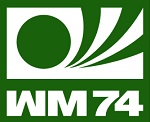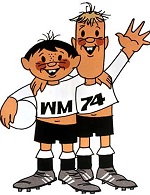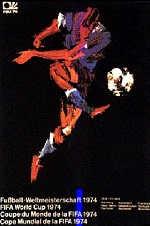|
Background |
The 1974 World Cup Finals, the tenth FIFA
World Cup, were held in West Germany from 13 June to 7 July. West Germany were chosen
as hosts at the 35th FIFA Congress in London on 6 July 1966
(along with those for the 1978 and 1982 Finals).
Spain and West Germany, both facing each other in the running for hosting duties
for the 1974 and 1982 World Cups, agreed to withdraw from each other's bidding
process.
The tournament marked the first time that
the FIFA World Cup Trophy created by the Italian sculptor Silvio Gazzaniga,
was awarded.
|
 |
|
The Draw |
The sixteen participating teams were divided
into four groups, first by seeded teams and then by geographical
location. All four teams will play each other once, at a draw
conducted at the Radio Hall of Radio Hessen in Frankfurt on 5
January 1974.
|
West Europe |
East Europe |
South America |
Rest of the World |
|
West Germany (seeded) |
Bulgaria |
Brazil (seeded) |
Australia |
|
Italy (seeded) |
German Democratic Republic |
Argentina |
Haiti |
|
Netherlands |
Poland |
Chile |
Sweden |
|
Scotland |
Yugoslavia |
Uruguay (seeded) |
Zaire |
The top two teams were then divided
into two groups, in which all four teams would play each
other once. The winners would then play each other in the
final, and the runners-up in the third-place match.
|
|
 |
|
England |
Following a World Cup where
they had qualified as hosts, and then one as holders, England
found themselves having to win a World Cup qualification group
for the first time in twelve years. They were paired with Poland
and Wales in Group Five. With little room for error, England
were held to a 1-1 draw at Wembley by the Welsh, after beating
them in Cardiff. They then suffered their first ever World Cup
qualifying defeat; 2-0, in Poland, with Alan Ball being sent
off, but they could still qualify if they could win the return
at Wembley on 17 October, 1973. England threw the kitchen sink
at the Poles, but a combination of near misses, desperate
goal-line clearances and some unorthodox goalkeeping, somehow
kept the score at 1-1 and England were out. Sir Alf Ramsey was
eventually sacked. |
|
|

|
|
The
Second Phase |
|
Team |
P
|
W
|
D
|
L
|
F
|
A
|
GD
|
Pts
|
|
Netherlands |
3 |
3 |
0 |
0 |
8 |
0 |
+8 |
6 |
|
Brazil |
3 |
2 |
0 |
1 |
3 |
3 |
=0 |
4 |
|
GDR |
3 |
0 |
1 |
2 |
1 |
4 |
-3 |
1 |
|
Argentina |
3 |
0 |
1 |
2 |
2 |
7 |
-5 |
1 |
|
26 June 1974 -
both 7:30pm CET |
Netherlands 4 Argentina 0 [2-0]
Parkstadion,
Gelsenkirchen (55,348) |
Cruijff (2), Krol, Rep |
Brazil 1 GDR 0 [0-0]
Niedersachsenstadion, Hannover (58,463) |
Rivelino |
|
30 June 1974 -
both 4:00pm CET |
Brazil 2 Argentina 1 [1-1]
Niedersachsenstadion, Hannover (38,000) |
Rivelino, Jairzinho
Brindisi |
Netherlands 2 GDR 0
[1-0]
Parkstadion, Gelsenkirchen (67,148) |
Neeskens, Rensenbrink |
|
3 July 1974 -
both 7:30pm CET |
Argentina 1
GDR 1 [1-1]
Parkstadion, Gelsenkirchen (53,054) |
Houseman
Streich |
Netherlands 2 Brazil 0 [0-0]
Westfalenstadion,
Dortmund (52,500) |
Neeskens, Cruijff |
 Pereira Pereira |
|
|
Group A |
 |
|
Group B |
|
Team |
P
|
W
|
D
|
L
|
F
|
A
|
GD
|
Pts
|
|
West Germany |
3 |
3 |
0 |
0 |
7 |
2 |
+5 |
6 |
|
Poland |
3 |
2 |
0 |
1 |
3 |
2 |
+1 |
4 |
|
Sweden |
3 |
1 |
0 |
2 |
4 |
6 |
-2 |
2 |
|
Yugoslavia |
3 |
0 |
0 |
3 |
2 |
6 |
-4 |
0 |
|
26 June 1974
-
all CET |
4:00pm -
West Germany 2 Yugoslavia 0 [1-0]
Rheinstadion, Düsseldorf (66,085) |
Breitner, Müller |
7:30pm -
Poland 1 Sweden 0 [1-0]
Neckarstadion, Stuttgart (43,755) |
Lato |
|
30 June 1974 |
4:00pm -
Poland 2 Yugoslavia 1 [1-1]
Waldstadion, Frankfurt (53,200) |
Deyna (pen), Lato
Karasi |
7:30pm -
West Germany 4 Sweden 2 [0-1]
Rheinstadion, Düsseldorf
(67,861) |
Overath, Bonhof, Grabowski, Hoeneß
Edström,
Sandberg |
|
3 July 1974 |
4:30pm -
West Germany 1 Poland 0 [0-0]
Waldstadion, Frankfurt am Main (61,249) |
Müller |
7:30pm CET -
Sweden 2 Yugoslavia 1 [1-1]
Rheinstadion, Düsseldorf (37,700) |
Edström, Torstensson
Šurjak |
|
|
|
|
Third Place
Play-off |
|
6 July 1974 -
4:00pm CET |
Poland 1 Brazil 0 [0-0]
Olympiastadion, München (74,100) |
Lato |
|
|
|
|
The
1974 Final |
|
7 July 1974 -
4:00pm CET |
West Germany 2 Netherlands 1 [2-1]
Olympiastadion, München (77,833) |
Breitner (pen),
Müller
Neeskens
(pen) |
|
|
 |
|

